七下Unit 1 Can you play the guitar?单元复习课件(共44张PPT)
文档属性
| 名称 | 七下Unit 1 Can you play the guitar?单元复习课件(共44张PPT) |  | |
| 格式 | pptx | ||
| 文件大小 | 1.5MB | ||
| 资源类型 | 教案 | ||
| 版本资源 | 人教新目标(Go for it)版 | ||
| 科目 | 英语 | ||
| 更新时间 | 2023-06-16 21:15:29 | ||
图片预览

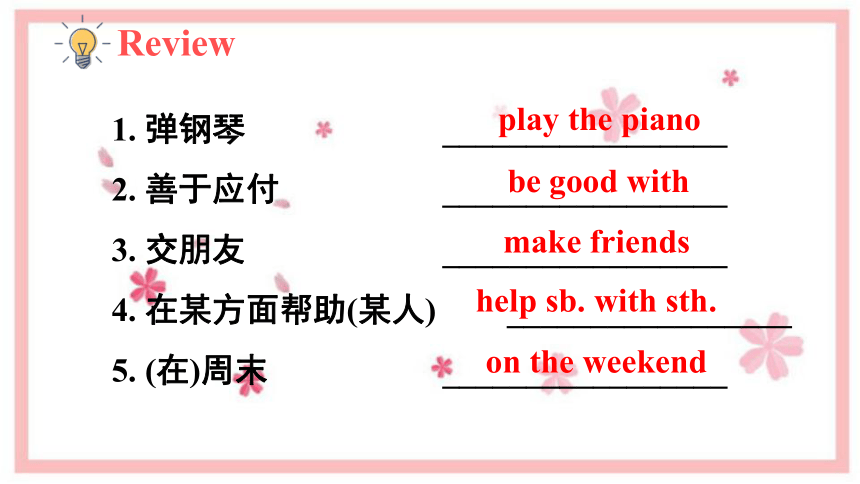
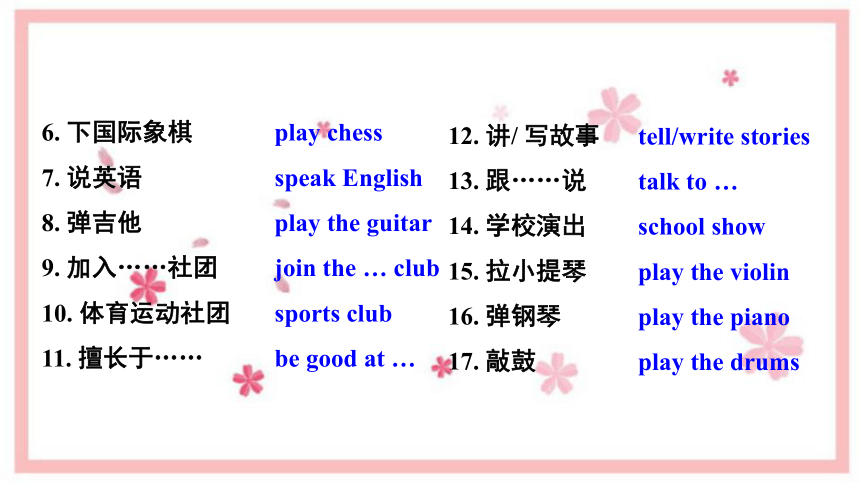
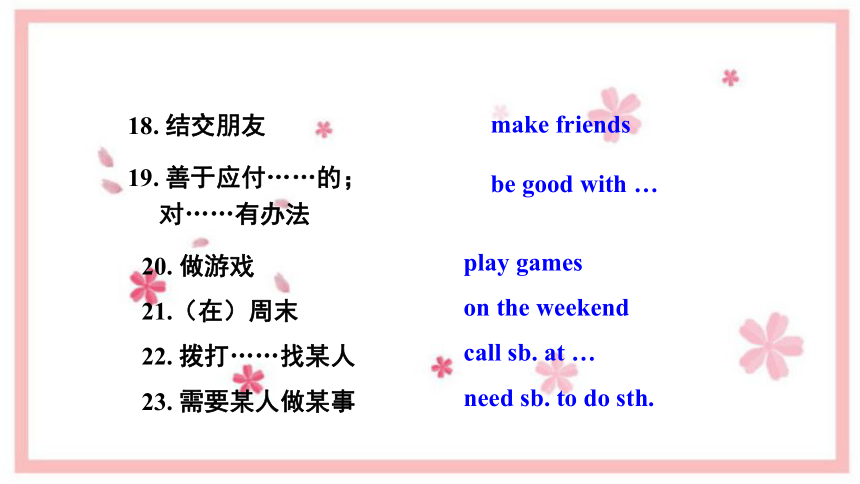
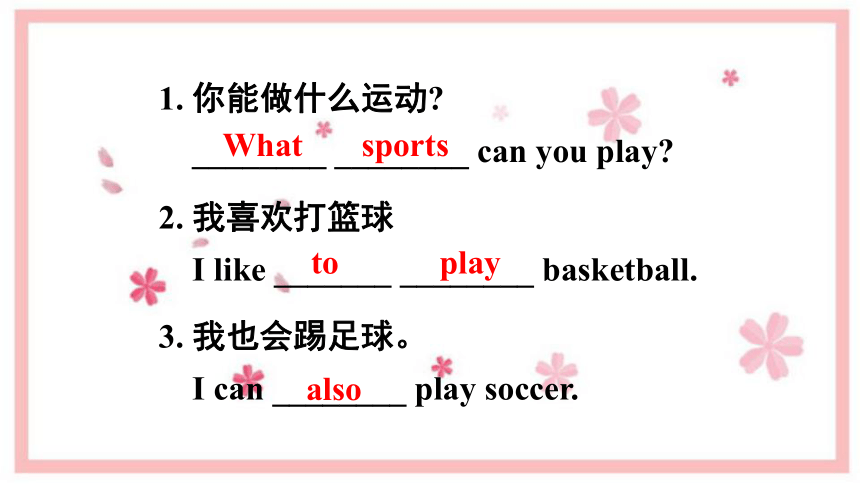

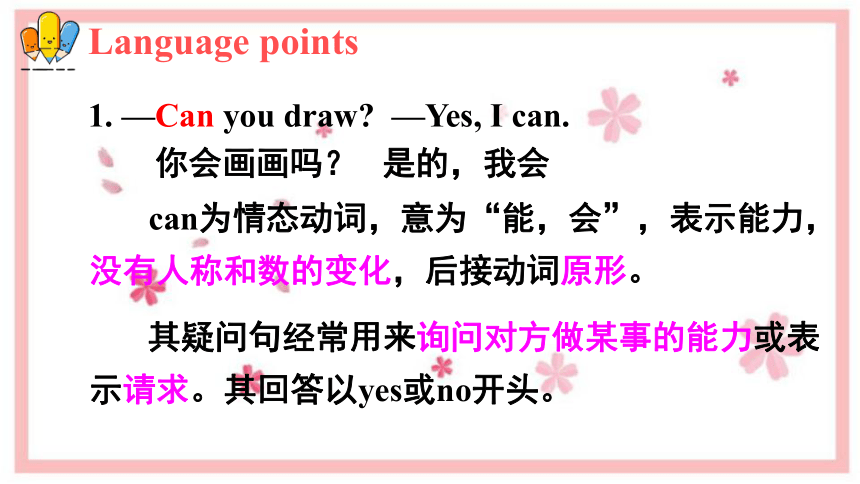
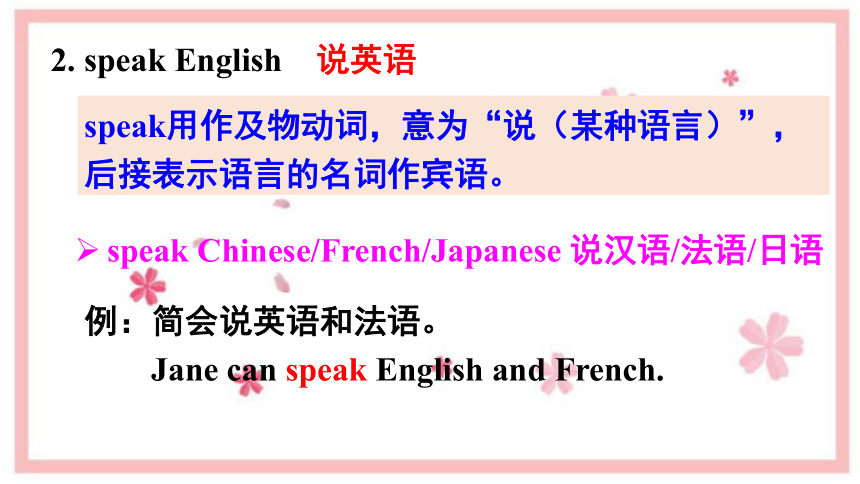
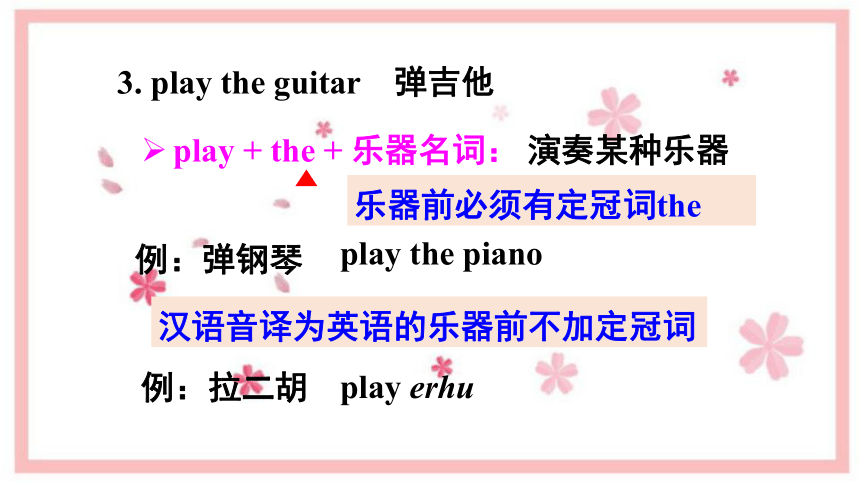
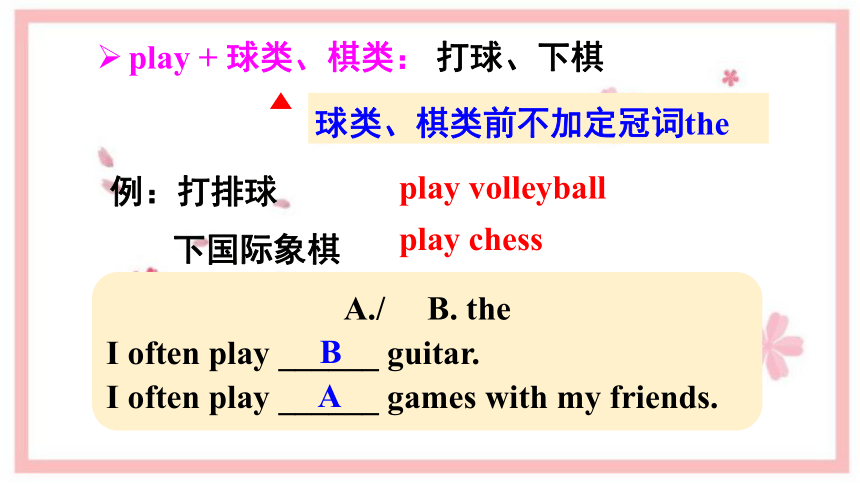
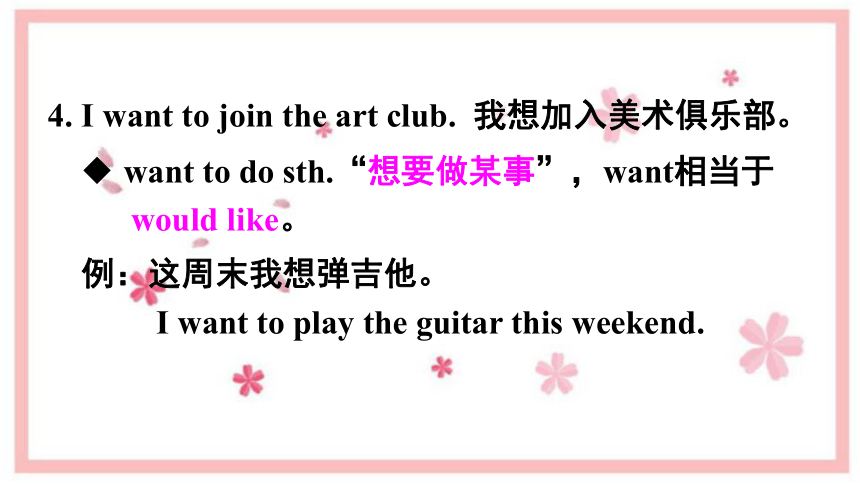
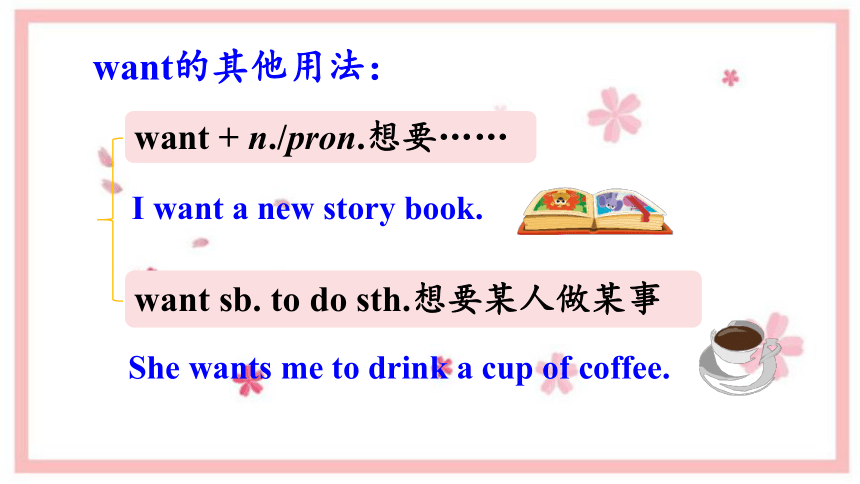
文档简介
(共44张PPT)
Unit 1 Can you play the guitar
复习课件
Review
1. 弹钢琴 _________________
2. 善于应付 _________________
3. 交朋友 _________________
4. 在某方面帮助(某人) _________________
5. (在)周末 _________________
play the piano
be good with
make friends
help sb. with sth.
on the weekend
play chess
speak English
play the guitar
join the … club
sports club
be good at …
6. 下国际象棋
7. 说英语
8. 弹吉他
9. 加入……社团
10. 体育运动社团
11. 擅长于……
tell/write stories
talk to …
school show
play the violin
play the piano
play the drums
12. 讲/ 写故事
13. 跟……说
14. 学校演出
15. 拉小提琴
16. 弹钢琴
17. 敲鼓
make friends
be good with …
18. 结交朋友
19. 善于应付……的;
对……有办法
play games
on the weekend
call sb. at …
need sb. to do sth.
20. 做游戏
21.(在)周末
22. 拨打……找某人
23. 需要某人做某事
1. 你能做什么运动
________ ________ can you play
2. 我喜欢打篮球
I like _______ ________ basketball.
3. 我也会踢足球。
I can ________ play soccer.
What sports
to play
also
4. 你善于与老人相处吗
_______ you good _______ old people
5. 请在今天拨打 689-7729与我们联系!
Please _______ us ______ 689-7729 today!
Are with
call at
Language points
1. —Can you draw —Yes, I can.
你会画画吗? 是的,我会
can为情态动词,意为“能,会”,表示能力,没有人称和数的变化,后接动词原形。
其疑问句经常用来询问对方做某事的能力或表示请求。其回答以yes或no开头。
2. speak English 说英语
speak Chinese/French/Japanese 说汉语/法语/日语
speak用作及物动词,意为“说(某种语言)”,后接表示语言的名词作宾语。
例:简会说英语和法语。
Jane can speak English and French.
3. play the guitar 弹吉他
play + the + 乐器名词: 演奏某种乐器
乐器前必须有定冠词the
例:弹钢琴
play the piano
汉语音译为英语的乐器前不加定冠词
例:拉二胡
play erhu
play + 球类、棋类: 打球、下棋
球类、棋类前不加定冠词the
例:打排球
play volleyball
A./ B. the
I often play ______ guitar.
I often play ______ games with my friends.
A
B
下国际象棋
play chess
4. I want to join the art club. 我想加入美术俱乐部。
want to do sth.“想要做某事”,want相当于
would like。
例:这周末我想弹吉他。
I want to play the guitar this weekend.
want的其他用法:
want + n./pron.想要……
want sb. to do sth.想要某人做某事
I want a new story book.
She wants me to drink a cup of coffee.
5. What about you 你呢?
(1) What about … 是双方交谈时用来承接上下文的转折语。一般用于回答别人的问题之后, 反问对方同样的问题。
例:我来自北京。你呢?
I’m from Beijing. What about you
(2) What about … 不仅可以用来提建议和请求,还可以用来征询对方的看法、意见、打算、身体状况和天气状况等。
例:今晚我们看《功夫熊猫》怎么样?
What /How about seeing Kung fu Panda tonight
about后接 n./ pron. /doing
6. You’re very good at telling stories.
be good at…
=do well in…
例:他擅长游泳。
He is good at swimming.
He does well in swimming.
+n./ pron. /doing
擅长于……
good的其他短语:
拓
展
be good for 对……有好处
be good to sb. 对……友好
be good with 善于应付……的
tell stories 为固定短语,意为“讲故事”。
tell“讲述;告诉”,用法为:
tell sb. sth. 告诉某人某事
tell sb. to do sth. 告诉某人做某事
tell sb. not to do sth. 告诉某人不要做某事
7. I can speak English and I can also play soccer.
and是并列连词,意为“和;而且;还”。用于连接两个并列的成分,表示并列、对比、顺承、结果等,译法很灵活,有时可不译出。
例:我和汤姆是同学。
Tom and I are classmates.
讲解1
讲解2
also是副词,意为“也;而且”,常用于肯定句,位于情态动词、助动词或系动词之后,实义动词之前。
例:她歌唱得好,舞也跳得好。
She sings well and also dances well.
他也是一名医生。 He is also a doctor.
辨析:also, too 与 either
also
too
either
“也;而且”,常放在情态动词、助动词或系动词之后,实义动词之前,用于肯定句中。
“也”,常放在肯定句的末尾,通常其前加逗号与句子的前一部分隔开。
“也(不)”,常放在否定句的末尾,通常其前加逗号与句子的前一部分隔开。
8. I like to talk and play games with people.
like作动词,意为“喜欢”,后面可以接动词-ing形式,也可以接动词不定式。
like doing sth. 表示习惯性的动作,一贯地
喜欢做某事。
like to do sth. 表示一次性地喜欢去做某事,
不表示习惯。
例:晚饭后我喜欢散步。
I like going for a walk after dinner.
我经常在周末做运动,但是今天我不想做了。
I often do sports on the weekend, but I don’t
like to do it today.
9. I’m in the school music club. 我在学校音乐社团。
be in+组织,“成为……中的一员”。
相当于“be a member of+组织”,强调状态。
be in +衣服,“穿着”,表示状态。
例:他父亲在一个摇滚乐队。
His father is in a rock band.
10. Are you busy after school 放学后你忙吗
busy作形容词,意为“忙碌的;忙的”,反义词是“free”。
常用短语:
be busy doing sth. 忙于做某事
be busy with sth. 忙于某事
例:我弟弟正忙于做家庭作业。
My brother is busy doing his homework.
=My brother is busy with his homework.
11. Then we need you to help with sports for English-speaking students.
讲解1
need +n./pron./to do 需要……
变否定句或疑问句时,需借助助动词do或does。
need
need sth.
需要某物
need to do sth.
需要做某事
need sb. to do sth.
需要某人做某事
常用于如下结构:
help sb. with sth. “在某方面帮助某人”
=help sb. (to) do sth. “帮助某人做某事”
Miss Zhao helps me with my English.
= Miss Zhao helps me (to) learn English.
讲解2
English-speaking
English + speaking→形容词,“说英语的”
English-speaking countries 说英语的国家
French-speaking students 说法语的学生
Japanese-speaking ladies 说日语的女士
讲解3
12. Are you good with old people
你善于跟老人打交道吗?
be good with ...
善于应付……的;对……有办法
例:这些父母对孩子们有一套。
These parents are good with children.
13. They can tell you stories, and you can make friends.
make friends意为“结交朋友”,其中friend要用复数形式。make friends with sb. 意为“和某人交朋友”。
例:玛丽亚是新来的。她想尽快与她的同学
们成为朋友。
Maria is new here. She wants to make friends
with her classmates as soon as possible.
讲解1
14. Please call us at 689-7729 today!
请在今天拨打电话689-7729与我们联系!
call是动词,意思是“(给……)打电话”。
call sb. at +电话号码:拨打某号码联系某人。
15. The school needs help to teach music.
学校需要(有人来)帮忙教音乐。
讲解1
help作不可数名词,“帮助”。
with sb.’s help“在某人的帮助下”,相当于with the help of sb.。
讲解2
teach及物动词,“教;讲授”,其第三人称单数形式为teaches。teacher 名词,“教师;老师”。
例:我们教王平英语。
We teach Wang Ping English.
teach
teach sb. sth.
教给某人某事
teach sb. to do sth.
教某人做某事
teach oneself
自学
其常用结构有:
情态动词 can
can 是情态动词,“能,会”,表示某人或某物具备的能力,还可用来提出请求,没有人称和数的变化,后面直接接动词原形。
can的用法
1. 表示“能力”,意为“能,会”。
例:我会讲英语。
I can speak English.
2.表示“请求”或“许可”。
例:你能帮我学汉语吗?
Can you help me with my Chinese
句式结构
① 肯定句:主语+can+动词原形+其他.
② 否定句:主语+cannot/can’t+动词原形+其他.
③ 一般疑问句: Can+主语+动词原形+其他
肯定回答: Yes, 主语+can.
否定回答: No, 主语+can’t.
④特殊疑问句:疑问词 + can + 主语 + 动词原形
例:你会做什么
What can you do
他能加入什么俱乐部
What club can he join
He can speak English.
陈述句
He can’t speak English.
否定句
Can he speak English
一般疑问句
Yes, he can.
No, he can’t.
肯定回答
否定回答
特殊疑问句
What can he do
语法精炼
1. — Tony, ______ you sing English songs
— Yes, I can.
A. can B. may C. need D. must
2. — Can you play the guitar
— ___________.
A. Yes, I can’t B. No, I can
C. No, I can’t D. Yes, I do
3. — What can you do
— I can ______.
A. to sing B. sing
C. singing D. sings
4. — ______ you play tennis
— No, but I am good at playing football.
A. Can B. May
C. Must D. Should(应该)
How to write a good ad
…Wanted for…
Do you like …
Can you …
Can you …
Can you …
Then you can be/join…
Please call … at …
你们学校打算在暑假期间招聘临时辅导老师,有意者请拨打电话 666-7620与Mr. Brown联系。请你根据下面的要求写一则50词左右的招聘广告。要求如下:
1.喜欢和孩子打交道。
2.会唱歌、会跳舞、会画画,会玩电脑游戏。
3.暑假期间有充足的时间。____________________________________________ ____________________________________________
Practice
Unit 1 Can you play the guitar
复习课件
Review
1. 弹钢琴 _________________
2. 善于应付 _________________
3. 交朋友 _________________
4. 在某方面帮助(某人) _________________
5. (在)周末 _________________
play the piano
be good with
make friends
help sb. with sth.
on the weekend
play chess
speak English
play the guitar
join the … club
sports club
be good at …
6. 下国际象棋
7. 说英语
8. 弹吉他
9. 加入……社团
10. 体育运动社团
11. 擅长于……
tell/write stories
talk to …
school show
play the violin
play the piano
play the drums
12. 讲/ 写故事
13. 跟……说
14. 学校演出
15. 拉小提琴
16. 弹钢琴
17. 敲鼓
make friends
be good with …
18. 结交朋友
19. 善于应付……的;
对……有办法
play games
on the weekend
call sb. at …
need sb. to do sth.
20. 做游戏
21.(在)周末
22. 拨打……找某人
23. 需要某人做某事
1. 你能做什么运动
________ ________ can you play
2. 我喜欢打篮球
I like _______ ________ basketball.
3. 我也会踢足球。
I can ________ play soccer.
What sports
to play
also
4. 你善于与老人相处吗
_______ you good _______ old people
5. 请在今天拨打 689-7729与我们联系!
Please _______ us ______ 689-7729 today!
Are with
call at
Language points
1. —Can you draw —Yes, I can.
你会画画吗? 是的,我会
can为情态动词,意为“能,会”,表示能力,没有人称和数的变化,后接动词原形。
其疑问句经常用来询问对方做某事的能力或表示请求。其回答以yes或no开头。
2. speak English 说英语
speak Chinese/French/Japanese 说汉语/法语/日语
speak用作及物动词,意为“说(某种语言)”,后接表示语言的名词作宾语。
例:简会说英语和法语。
Jane can speak English and French.
3. play the guitar 弹吉他
play + the + 乐器名词: 演奏某种乐器
乐器前必须有定冠词the
例:弹钢琴
play the piano
汉语音译为英语的乐器前不加定冠词
例:拉二胡
play erhu
play + 球类、棋类: 打球、下棋
球类、棋类前不加定冠词the
例:打排球
play volleyball
A./ B. the
I often play ______ guitar.
I often play ______ games with my friends.
A
B
下国际象棋
play chess
4. I want to join the art club. 我想加入美术俱乐部。
want to do sth.“想要做某事”,want相当于
would like。
例:这周末我想弹吉他。
I want to play the guitar this weekend.
want的其他用法:
want + n./pron.想要……
want sb. to do sth.想要某人做某事
I want a new story book.
She wants me to drink a cup of coffee.
5. What about you 你呢?
(1) What about … 是双方交谈时用来承接上下文的转折语。一般用于回答别人的问题之后, 反问对方同样的问题。
例:我来自北京。你呢?
I’m from Beijing. What about you
(2) What about … 不仅可以用来提建议和请求,还可以用来征询对方的看法、意见、打算、身体状况和天气状况等。
例:今晚我们看《功夫熊猫》怎么样?
What /How about seeing Kung fu Panda tonight
about后接 n./ pron. /doing
6. You’re very good at telling stories.
be good at…
=do well in…
例:他擅长游泳。
He is good at swimming.
He does well in swimming.
+n./ pron. /doing
擅长于……
good的其他短语:
拓
展
be good for 对……有好处
be good to sb. 对……友好
be good with 善于应付……的
tell stories 为固定短语,意为“讲故事”。
tell“讲述;告诉”,用法为:
tell sb. sth. 告诉某人某事
tell sb. to do sth. 告诉某人做某事
tell sb. not to do sth. 告诉某人不要做某事
7. I can speak English and I can also play soccer.
and是并列连词,意为“和;而且;还”。用于连接两个并列的成分,表示并列、对比、顺承、结果等,译法很灵活,有时可不译出。
例:我和汤姆是同学。
Tom and I are classmates.
讲解1
讲解2
also是副词,意为“也;而且”,常用于肯定句,位于情态动词、助动词或系动词之后,实义动词之前。
例:她歌唱得好,舞也跳得好。
She sings well and also dances well.
他也是一名医生。 He is also a doctor.
辨析:also, too 与 either
also
too
either
“也;而且”,常放在情态动词、助动词或系动词之后,实义动词之前,用于肯定句中。
“也”,常放在肯定句的末尾,通常其前加逗号与句子的前一部分隔开。
“也(不)”,常放在否定句的末尾,通常其前加逗号与句子的前一部分隔开。
8. I like to talk and play games with people.
like作动词,意为“喜欢”,后面可以接动词-ing形式,也可以接动词不定式。
like doing sth. 表示习惯性的动作,一贯地
喜欢做某事。
like to do sth. 表示一次性地喜欢去做某事,
不表示习惯。
例:晚饭后我喜欢散步。
I like going for a walk after dinner.
我经常在周末做运动,但是今天我不想做了。
I often do sports on the weekend, but I don’t
like to do it today.
9. I’m in the school music club. 我在学校音乐社团。
be in+组织,“成为……中的一员”。
相当于“be a member of+组织”,强调状态。
be in +衣服,“穿着”,表示状态。
例:他父亲在一个摇滚乐队。
His father is in a rock band.
10. Are you busy after school 放学后你忙吗
busy作形容词,意为“忙碌的;忙的”,反义词是“free”。
常用短语:
be busy doing sth. 忙于做某事
be busy with sth. 忙于某事
例:我弟弟正忙于做家庭作业。
My brother is busy doing his homework.
=My brother is busy with his homework.
11. Then we need you to help with sports for English-speaking students.
讲解1
need +n./pron./to do 需要……
变否定句或疑问句时,需借助助动词do或does。
need
need sth.
需要某物
need to do sth.
需要做某事
need sb. to do sth.
需要某人做某事
常用于如下结构:
help sb. with sth. “在某方面帮助某人”
=help sb. (to) do sth. “帮助某人做某事”
Miss Zhao helps me with my English.
= Miss Zhao helps me (to) learn English.
讲解2
English-speaking
English + speaking→形容词,“说英语的”
English-speaking countries 说英语的国家
French-speaking students 说法语的学生
Japanese-speaking ladies 说日语的女士
讲解3
12. Are you good with old people
你善于跟老人打交道吗?
be good with ...
善于应付……的;对……有办法
例:这些父母对孩子们有一套。
These parents are good with children.
13. They can tell you stories, and you can make friends.
make friends意为“结交朋友”,其中friend要用复数形式。make friends with sb. 意为“和某人交朋友”。
例:玛丽亚是新来的。她想尽快与她的同学
们成为朋友。
Maria is new here. She wants to make friends
with her classmates as soon as possible.
讲解1
14. Please call us at 689-7729 today!
请在今天拨打电话689-7729与我们联系!
call是动词,意思是“(给……)打电话”。
call sb. at +电话号码:拨打某号码联系某人。
15. The school needs help to teach music.
学校需要(有人来)帮忙教音乐。
讲解1
help作不可数名词,“帮助”。
with sb.’s help“在某人的帮助下”,相当于with the help of sb.。
讲解2
teach及物动词,“教;讲授”,其第三人称单数形式为teaches。teacher 名词,“教师;老师”。
例:我们教王平英语。
We teach Wang Ping English.
teach
teach sb. sth.
教给某人某事
teach sb. to do sth.
教某人做某事
teach oneself
自学
其常用结构有:
情态动词 can
can 是情态动词,“能,会”,表示某人或某物具备的能力,还可用来提出请求,没有人称和数的变化,后面直接接动词原形。
can的用法
1. 表示“能力”,意为“能,会”。
例:我会讲英语。
I can speak English.
2.表示“请求”或“许可”。
例:你能帮我学汉语吗?
Can you help me with my Chinese
句式结构
① 肯定句:主语+can+动词原形+其他.
② 否定句:主语+cannot/can’t+动词原形+其他.
③ 一般疑问句: Can+主语+动词原形+其他
肯定回答: Yes, 主语+can.
否定回答: No, 主语+can’t.
④特殊疑问句:疑问词 + can + 主语 + 动词原形
例:你会做什么
What can you do
他能加入什么俱乐部
What club can he join
He can speak English.
陈述句
He can’t speak English.
否定句
Can he speak English
一般疑问句
Yes, he can.
No, he can’t.
肯定回答
否定回答
特殊疑问句
What can he do
语法精炼
1. — Tony, ______ you sing English songs
— Yes, I can.
A. can B. may C. need D. must
2. — Can you play the guitar
— ___________.
A. Yes, I can’t B. No, I can
C. No, I can’t D. Yes, I do
3. — What can you do
— I can ______.
A. to sing B. sing
C. singing D. sings
4. — ______ you play tennis
— No, but I am good at playing football.
A. Can B. May
C. Must D. Should(应该)
How to write a good ad
…Wanted for…
Do you like …
Can you …
Can you …
Can you …
Then you can be/join…
Please call … at …
你们学校打算在暑假期间招聘临时辅导老师,有意者请拨打电话 666-7620与Mr. Brown联系。请你根据下面的要求写一则50词左右的招聘广告。要求如下:
1.喜欢和孩子打交道。
2.会唱歌、会跳舞、会画画,会玩电脑游戏。
3.暑假期间有充足的时间。____________________________________________ ____________________________________________
Practice
同课章节目录
- Unit 1 Can you play the guitar?
- Section A
- Section B
- Unit 2 What time do you go to school?
- Section A
- Section B
- Unit 3 How do you get to school?
- Section A
- Section B
- Unit 4 Don't eat in class.
- Section A
- Section B
- Unit 5 Why do you like pandas?
- Section A
- Section B
- Unit 6 I'm watching TV.
- Section A
- Section B
- Review of Units 1-6
- Unit 7 It's raining!
- Section A
- Section B
- Unit 8 Is there a post office near here?
- Section A
- Section B
- Unit 9 What does he look like?
- Section A
- Section B
- Unit 10 I'd like some noodles.
- Section A
- Section B
- Unit 11 How was your school trip?
- Section A
- Section B
- Unit 12 What did you do last weekend?
- Section A
- Section B
